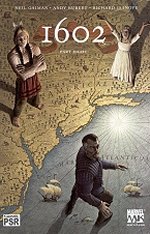1602
#8
writer: Neil Gaiman
artist: Andy Kubert
A year ago, much of fandom was abuzz over this series. Neil
Gaiman would take his first ever whack at the Marvel Universe
(second if you count his work on Alice Cooper) in a
mini-series that would change everything we knew about its
reality. And for many issues, Gaiman did have us strung along
with his intriguing recasting of Marvel's heroes as players
in a Jacobean drama.
But why, you might ask, why did all of it happen?
In the end, the answers are as fleeting and frustrating
as the mystery Gaiman set up in the first place. Due to an
object from the future being placed in the past, history began
compressing itself. When that object turned out to be Captain
America, a man who lived far past his time and now, far before
it, a desperate race began. Various factions struggled to
take him back to that anomalous point in the so-called "New
World" that would return Steve Rogers to a braver newer one,
righting history and restoring reality as we know it.
All well and good, except that by making this the goal,
it short-circuits and in some ways renders completely irrelevant
all the political posturing that had made the series so interesting.
So what if King James planned on destroying all the Witchbreed
(17th Century-speak for mutants) in the name of misguided
religious zeal? How did Magneto end up actually leading the
Inquisition? Even interpersonal subplots have no place to
go - this version of the Cyclops/Angel romantic rivalry could
take an interesting turn, but not in this mini-series. In
the end, the promised clashes just fizzle out.
Even the potential impact of a Norse God walking a world
seized by Catholicism gets only a nod. Yes, the power of Thor
is both tempting and damning, but the issue gets dwarfed by
the usual end of the world.
Gaiman seems to have learned Marvel's new bait and switch
technique. If you've got a mini-series that looks to be extremely
popular, only give the illusion of answers so you can deliver
a sequel. See Origin for the textbook example. All
the court intrigue adds up to naught, though it may pay off
…later. Many have been puzzled by the rumor that Gaiman would
pick up a Nick Fury series down the road, but not set in the
world of 1602. It may still be nothing more than rumor,
but the series ends in a way that sets up a Fury we've never
seen before.
It also ends in a way that we have seen before, which
only goes to prove that there's a finite number of plots.
Good writers just tart them up differently. If you thought
you'd put Heroes Reborn behind you, you're wrong.
What redeems 1602 is the characterization, which
more than occasionally rises above a "oh, what a cool way
to fit that character in" level. It never does for the crew
of the Fantastick, except for The Invisible Woman, but the
aforementioned Fury proves himself absolutely worth further
exploration, even though he's not particularly likeable. Gaiman's
take on Captain America, too, speaks volumes about the man
rather than the symbol, even as Rogers desperately tries to
wrap himself back up in symbology.
It all adds up to an above average What If -- ?,
and I don't know why I expected more. Perhaps because, really,
in the end, it hasn't made a difference in the larger Marvel
continuity. Those who did not read 1602 will not know
what they missed, and somehow, it should have been an event
that had impact. Now we're just going to sit here and wait
for the next hype piece that promises to change the Marvel
Universe as we know it.
It's still readable and fun to long-time fans, but like
Avengers/JLA, 1602 had the chance to reach beyond
that and failed.
Rating: 






